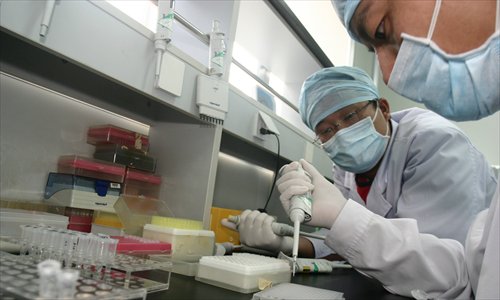
Its efficacy in customized fitness plans has made genetic testing a hit among Chinese looking to lose those stubborn kilos. (Photo: Li Hao/GT)
Jie Xiaoqian, a 25-year-old woman based in Xiamen, Fujian Province, has recently been increasingly bothered by her weight. Her weight is usually within the standard range of around 55 kilograms, but she gained 5 kilos in the past year, even though she tried many ways to lose weight.
She feels her figure is slowly becoming more and more like that of her mother, who was very slim in her youth but gradually gained weight as she aged. Jie worries whether she is doomed to be overweight and wonders whether there is a way out.
"I decided to do a genetic test," declared Jie. She sent a 2 milliliter sample of her saliva to Meigene, a genetic testing institution based in Xiamen, on July 5.
Nowadays, many people are doing genetic tests to learn more about their bodies and health. According to Song Xiaojun, a genetic counselor at 23mofang Biological Technology Co Ltd, a genetic testing center based in Chengdu, Sichuan Province, they launched genetic testing services in September, and the orders from all over the country have been increasing month by month.
The reason genetic tests are getting popular in China might be their effectiveness in helping people lose weight, Song said. "Genes help people to know more about their body and how to become more healthy."
According to Song, many kinds of genes can trigger obesity and a genetic test can identify them. For example, the fat mass and obesity-associated (FTO) gene, which has been nicknamed the "foodie gene" in China, was proven to be linked to obesity.
He said people with this gene are more vulnerable to obesity because they have an insatiable appetite for fatty foods and feel less full after a meal.
The FTO gene is also the reason many people accumulate fat in their midsection and have an "apple-shaped body," said Song.
However, Song said that people can change their figure by sticking to a strict fitness plan, even if they are genetically predisposed to being overweight.
"In most cases, genetics is not the determining factor because it triggers weight gain jointly with an unhealthy lifestyle," said Song.
After gaining a basic understanding of their results, people can take advantage of their genetics and design the most efficient fitness plan to achieve their desired physique.
Song said there are many types of weight gain, which are caused by genetic mutations.
"Different genetic variants in different genes have different effects on one's figure," Song said.
According to researchers, there are two main variants of the FTO gene that put people at risk for obesity. One predisposes people to overeating and thereby leads to weight gain and the other causes the body to store fat more easily when people do not exercise.
Mutations of Apolipoprotein A-V (AP0A5), another "foodie gene," can make individuals with the gene more likely to gain weight from fatty foods than other people, so for them, a low-fat diet is a more efficient way to lose and perhaps maintain weight.
Understanding these differences has helped ease Jie's confusion.
"I decided to do the test because I always wondered why some people hardly gain weight, even if they usually eat a lot, and why some people can lose weight quickly with seemingly little effort or exercise," Jie said.
Despite the efficacy of a weight loss regimen that is based on genetic testing, some people are wary of giving away their privacy. Understanding their concern, Song said the results are presented as data, which is only meaningful when decoded and analyzed by a specialist using databases and programs.
"Also, the processed report only gives information about how much probability people have in different fields, instead of the current condition of their body," Song said.
Jie will receive her genetic test results in a few days, and she is really looking forward to it.
"With my genes' help, I can surely make an effective fitness plan," she said.


















































